Russell Lee | |
|---|---|
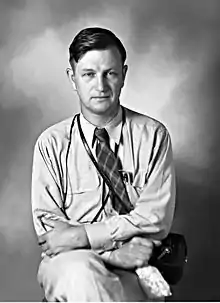 Lee, c. 1942 | |
| Born | Russell Werner Lee July 21, 1903 Ottawa, Illinois, United States |
| Died | August 28, 1986 (aged 83) Austin, Texas, United States |
Russell Werner Lee (July 21, 1903 – August 28, 1986)[1] was an American photographer and photojournalist, best known for his work for the Farm Security Administration (FSA) during the Great Depression. His images documented the ethnography of various American classes and cultures.
Early life

The son of Burton Lee and his wife Adeline Werner, Lee grew up in Ottawa, Illinois. He attended Culver Military Academy in Culver, Indiana, for high school. He earned a bachelor's degree in chemical engineering from Lehigh University in Bethlehem, Pennsylvania.[2]
Lee started working as a chemist, but gave up the position to become a painter. Originally he used photography as a precursor to his painting, but soon became interested in photography for its own sake. He recorded the people and places around him. Among his earliest subjects were Pennsylvanian bootleg mining and the Father Divine cult.[3]
Photography
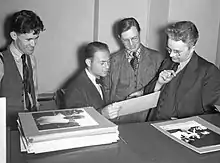
In the fall of 1936, during the Great Depression, Lee was hired for the federally sponsored Farm Security Administration (FSA) photographic documentation project of the Franklin D. Roosevelt administration. He joined a team assembled under Roy Stryker, along with Dorothea Lange, Arthur Rothstein, and Walker Evans. Stryker provided direction and bureaucratic protection to the group, leaving the photographers free to compile what in 1973 was described as "the greatest documentary collection which has ever been assembled."[2]
Over the spring and summer of 1942, Lee was one of several government photographers to document the forced relocation of Japanese Americans from the West Coast. He produced more than 600 images of families waiting to be removed and their later lives in various detention facilities, most located in isolated areas of the interior of the country.[4]
After the FSA was defunded in 1943, Lee served in the Air Transport Command (ATC). During this period, he took photographs of all the airfield approaches used by the ATC to supply the Armed Forces in World War II. In 1946 and 1947, he worked for the United States Department of the Interior (DOI), helping the agency compile a medical survey in communities involved in mining bituminous coal. He created over 4,000 photographs of miners and their working conditions in coal mines.[5] In 1946, Lee completed a series of photos focused on a Pentecostal Church of God in a Kentucky coal camp.[6]
While completing the DOI work, Lee also continued to work under Stryker. He produced public relations photographs for Standard Oil of New Jersey.[2]
In 1947 Lee moved to Austin, Texas, and continued photography. In 1965 he became the first instructor of photography at the University of Texas there.[2]
Legacy
Lee's work is held in collections at the University of Louisville, the New Mexico Museum of Art,[7] Wittliff collections, Texas State University;[8] the Dolph Briscoe Center for American History at the University of Texas at Austin,[9] and the Library of Congress.[10]
In 2016, Lee Elementary, a school in the Austin Independent School District, was renamed Russell Lee Elementary in honor of the photographer.
Selected photographs
 A conversation at the General Store near Jeanerette, Louisiana, 1938
A conversation at the General Store near Jeanerette, Louisiana, 1938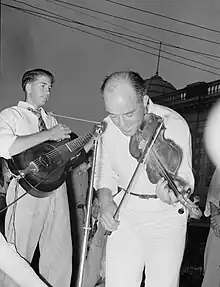 A Cajun fiddler in Crowley, Louisiana, 1938
A Cajun fiddler in Crowley, Louisiana, 1938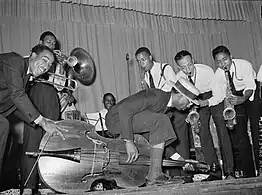 A hot orchestra performs specialty number in Crowley, 1938
A hot orchestra performs specialty number in Crowley, 1938 A resting farmer in Crowley, 1938
A resting farmer in Crowley, 1938 The window of Charlie's Electric Shoe Shop, 1938
The window of Charlie's Electric Shoe Shop, 1938 A segregated drinking fountain in Oklahoma City, Oklahoma, 1939
A segregated drinking fountain in Oklahoma City, Oklahoma, 1939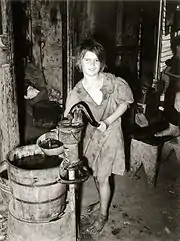 A child drawing water from a hand pump in Oklahoma City, 1939
A child drawing water from a hand pump in Oklahoma City, 1939 An elderly man born in slavery displaying a horn formerly used to call slaves near Marshall, Texas, 1939
An elderly man born in slavery displaying a horn formerly used to call slaves near Marshall, Texas, 1939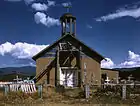 A Catholic church in Llano, New Mexico, 1940
A Catholic church in Llano, New Mexico, 1940 Food at the Pie Town, New Mexico fair, 1940
Food at the Pie Town, New Mexico fair, 1940 A quilt in Pie Town, 1940
A quilt in Pie Town, 1940 Shasta Dam under construction, 1942
Shasta Dam under construction, 1942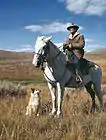 A Montana shepherd, 1942
A Montana shepherd, 1942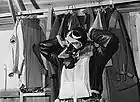 A U.S. airman donning oxygen apparatus, 1942
A U.S. airman donning oxygen apparatus, 1942 A child relocating to Owens Valley as part of the Japanese American internment, 1942
A child relocating to Owens Valley as part of the Japanese American internment, 1942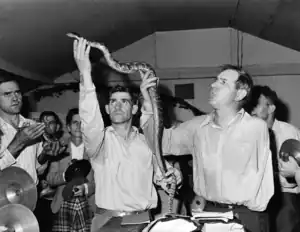 Snake handling in a Lejunior, Kentucky church, 1946
Snake handling in a Lejunior, Kentucky church, 1946
References
- ↑ "Russell Lee Photographic Collection". Explore UK. University of Kentucky. Retrieved July 29, 2023.
- 1 2 3 4 Hurley, F. Jack (February 14, 2010). "RUSSELL LEE: "F. Jack Hurley on Russell Lee" (1973)". ASX. Retrieved February 13, 2012.
- ↑ "Russell Lee". The People's America Farm Security Administration Series. Indiana University Art Museum. Retrieved February 13, 2012.
- ↑ Young, Morgen. "Russell Lee". Densho Encyclopedia. Retrieved August 28, 2014.
- ↑ Hurley, F. Jack. "Lee, Russell Werner". Texas State Historical Association. Retrieved February 12, 2012.
- ↑ Lee, Russell. "Faith healing, speaking in tongues, and taking up serpents in the name of God!". American Ethnography Quasimonthy. American Ethnography. Retrieved February 13, 2012.
- ↑ "Russell Lee Online". Artcyclopedia.com. Retrieved June 18, 2013.
- ↑ Russell Lee Photographs at The Wittliff Collection, Texas State University, San Marcos, TX
- ↑ "Russell Lee Photograph Collection at the Dolph Briscoe Center for American History". Lib.utexas.edu. Retrieved June 18, 2013.
- ↑ Bohnacker, Siobhán (August 14, 2014). "A Slice of America in 1940: Pie Town, New Mexico". The New Yorker. ISSN 0028-792X. Retrieved August 21, 2023.
External links
| Archives at | ||||
|---|---|---|---|---|
|
||||
| How to use archival material |
- Bernard Bourrit, "Russell Lee, impossible inventaire" in Gruppen, 2017.
- Biographical Sketch of Lee
- Online Russell Lee collection
- Article about Lee at the University of Texas website
- Flickr Photostream: LOC's Archive of Russell Lee's FSA Photos
- Wittliff Collection Southwestern and Mexican Photography, Texas State University
- "Captured: America in Color from 1939–1943", Denver Post PLog, July 26, 2010.
- Brisco – A Guide to the Russell Lee Photograph Collection, University of Texas
- Russell Lee's FSA Photos of Pie Town, New Mexico Museum of Art